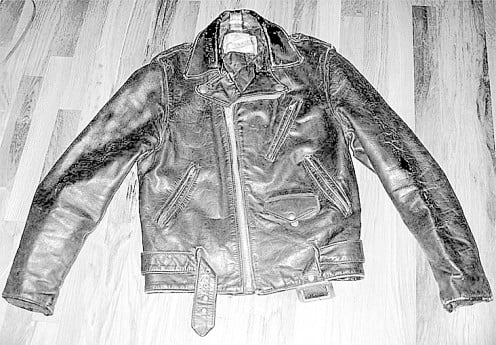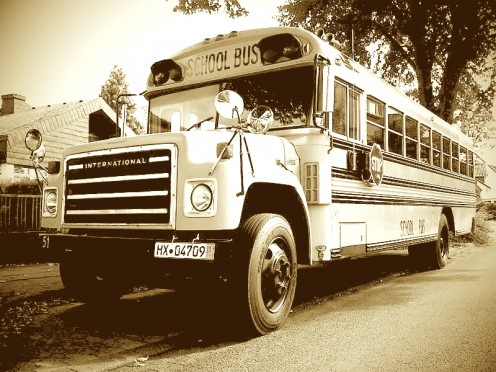"Responsibility," or "Driver, Boy and Girl"
Afternoon on a warm spring day in central Ontario, with a school bus dragging a dust plume up and down the county roads, bringing the high-schoolers back to the farms. Not last spring: on the spring day of which I write, then-Prime Minister Brian Mulroney had recently indulged in a bit of political music theatre, singing “When Irish Eyes Are Smiling” in duet with President Reagan. Hardly anyone worried about the exhaust from bus’s big Diesel, and one Dr. Eugene Stoermer had only just started casually using the term “Anthropocene” at biology conferences.

Bus drivers know it’s the afternoon runs that are apt to be trouble—in the mornings everyone’s still sleepy. It’s just too much trouble to make trouble. But on afternoon runs—and among other sources of trouble—boys can decide to try for girls’ attention in all manner of ways, many of which are as ill-considered as they are imaginative.
This afternoon it was the snapping of a cigarette lighter. That was already ‘bad,’ since the kids weren’t supposed to be smoking at all, and still less on school property. But a lighter snapped next to an unwary ear produced the flash of a spark, a louder noise than you might think, and enough outraged indignation to ensure a dressing-down of several minutes’ duration at least. If you were lucky, she might even slap you.
Of course, girls have their own ways of seeking attention--clothes, hairstyles and makeup among them. And this warm afternoon, attention had been courted with a liberal application of highly volatile hairspray.

Suddenly a carefully coiffed head shone with a flame halo, and jerked upright to high alarm—a move echoed all over the bus as multiple screams demolished routine. The driver kicked the brakes, hard. As the dust plume caught up to the bus, the usual mineral-and-exhaust odor was superseded by a reek of scorched hair.
The girl wasn’t sobbing. Shocked, shaken some, yes, but already she knew she wasn’t hurt. The driver, scanning her face, assured her there was no sign of a burn. Even her hair still looked pretty good—though its smell would now attract altogether the wrong sort of attention.
The perpetrator wasn’t far to seek—still in the seat behind her, apologetic and paler than she was. The driver’s heart sank a bit—he was the 15-year-old son of another driver, a woman working hard to raise the boy by herself. Basically a good kid, if a little lost—witness his reaction now!—but on ‘school probation’ because of something equally dumb, something involving his unauthorized presence on school property after hours. There was a good chance that this failed joke might get him kicked out for the rest of the school year.
“Professional courtesy,” thought the driver, doing his best to project the utmost contempt for such an abject piece of foolishness—not hard to do. He wished he was wearing his black leather jacket—it always made him feel more intimidating, at least. Too late in the year for that now, though—he’d be boiling, had he worn it, and would just look ridiculous.

“We’d better talk,” he growled.
It was hotter still beside the bus, with the still-high westerly sun reflecting off the chrome-yellow. Hard to be menacing. Windows were opening on the bus—just the heat? No—a visible effort to appear nonchalant meant the kids opening the windows were mainly trying to eavesdrop. Good. Let the moment build.
Finally, quietly: “You do know how lucky you are, right?”
Puzzlement.
“Yeah, lucky. Dumb as you were, there was no injury, just a scare. But tell me, what could have happened?”
More puzzlement.
“No, really—what could have happened? I’m really asking. Pretend it’s a movie. What’s the scariest thing?”
“Well, I guess her hair could have, like, kept burning. . .”
And they were off. Baldness. Blindness. Skin grafts. Law suits. Eventually, potential disasters started to run thin.
“So, the thing is,” said the driver, “you are actually pretty good at figuring out what could have happened. See, little kids can’t do that. And that’s OK, mostly, because mostly they can’t do that much damage, either.
“But it’s different for you now. You’re not a little kid, you’re starting to drive, you’re carrying lighters around, and I’ve even heard you know a thing or two about locks, right?”
A blush.
“Yeah. So you can’t be like that little kid anymore. He only thinks about what he means to happen, not what could happen. And that was you—you didn’t mean anything but a little harmless scare. But now you’re in trouble, ‘cause it went beyond just a little scare. And that’s going to happen nowadays, if you don’t think, because you now have the power to make serious stuff happen—really serious stuff.
“So if you want things to come out right for yourself, for your mom, for whoever, then you have to think first—really think. Can you do that?”
The driver could actually see him consider.
“Yeah—yeah, I can.”
“I sure hope so. I’m going to have to tell some folks about this, but maybe I can keep it unofficial. No, don’t thank me, dumbass—knowing your mom, it may actually be tougher this way.” He wanted the boy looking worried as he got back on the bus, after all.

Cue the Diesel, fade to black as the bus pulls away from the roadside, and call it a scene. But how do we imagine our actors today, after everything that’s happened since that warm spring—Free Trade, Meech Lake, Kyoto, 9/11? We remember Communist Afghanistan, the fall of the Soviet Union, the Taliban, Afghanistan again, and Iraq; remember price spikes and privatizations and big oil finds; remember Grunge, and JR getting shot, and Canada winning some Olympic gold, and Princes Harry and William growing up.
So do we imagine the boy middle-aged, just released from an eighteen month stretch in minimum security (out early for good behaviour), clean and sober with a new online degree in marketing and a determination to stop blaming everyone else? The driver, thinking tiredly back to the day in first grade when the big kids finally asked him to play ball, and wondering if he’d ever see a day like that again? The girl, practicing corporate law on Bay Street and raising two boys, all traces of the day she didn’t quite burn gone, except perhaps as a forgotten influence on her notoriously severe hairstyle?
We can only imagine who they might be, who they really are. But we do know that they are all the driver, carried on carbon wings, driving the bus without setting the route, trying to do their best for those under their care, and faking it the best they can when the rulebook doesn’t quite cover it. We know that, because that’s pretty much all of us.
And they—or we—are all the boy, too, all caught in the protracted passage of “Childhood’s End,” all struggling to make desire and thought work together, all hoping the trouble that’s coming isn’t too bad, all trying to learn how to be in charge at least of one’s self because at the end of the day that’s the control that really matters.
And we’re all the girl, as Geological Societies deliberate whether our time really should be called “the Anthropocene,” and political leaders do theatre, and childhood ends for us, but we watch “Survivor” or play “Gears of War” after our studies or our work, and we just do the next thing (as day follows day) in the faith that things will be as they have been, and we think little of any risk of burning. We take care of business, and take care of our own, and then take care of ourselves, finally, relaxing a bit because it is the end of the day.
Reality—we tell ourselves—is over-rated.









